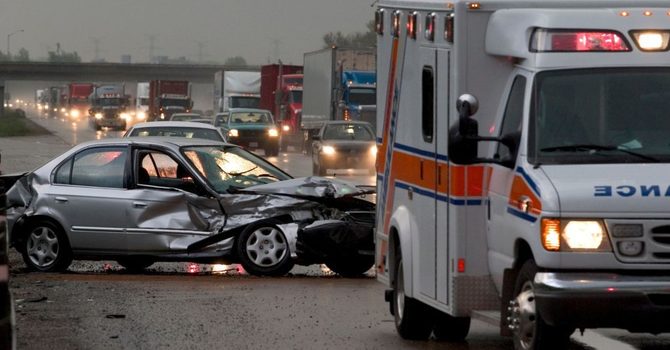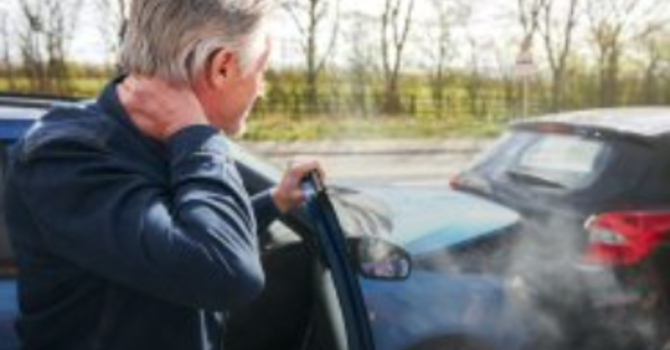You’ve just been in a car accident.
You feel okay but begin to feel a headache developing. It’s not noticeable at first, just a mild annoyance. You wait for it to resolve on its own. But then it doesn’t.
Soon a persisting headache accompanies you throughout your day, yet it has been weeks since the crash.
You may have a post-traumatic headache caused by the impact of the car accident.
In this article, we will navigate what type of headache-causing injuries you can sustain from a collision, treatment options to help relieve your pain, and other frequently asked questions about car accident headaches.
Table of Contents
- 4 Things That May Cause a Headache After a Car Accident
- What Does Chiropractic Treatment for Headache After a Car Accident Look Like?
- FAQs About Headaches After a Car Accident
- Is It Normal To Get Headaches After a Car Accident?
- How Long Might a Headache Last After a Car Accident?
- What Does a Whiplash Headache Feel Like?
- When Should You Visit a Doctor for Headaches After a Car Accident?
- Cascade Spine & Injury Center: Car Accident Injuries Specialists in Portland, OR

4 Things That May Cause a Headache After a Car Accident
Headaches due to car accidents may be the result of an injury.
During collisions, your car might jerk forward or be stopped upon impact. When this happens, your body will keep moving a moment longer than your car. Your body braces for impact as you are thrust against your seatbelt and possibly into other fixtures of the car.
Even mild car accidents may often result in brain injuries, muscle injuries, or jaw injuries, all of which may result in headaches.
Headaches caused by car crashes are generally referred to as post-traumatic headaches. Post-traumatic headaches are secondary headaches caused by trauma or injury with onset within seven days following the accident.
#1: Concussion
A concussion is a brain injury that is often caused by trauma inflicted directly on the head. The impact causes the brain to bounce off of the skull resulting in bleeding, tearing, and/or bruising. The CDC reports that 1.7 million Americans will have a concussion each year and 17% of those concussions are due to car accidents.
There are three grades of concussions, which are:
- Grade one: There is no loss of consciousness, but the possibility of temporary amnesia for thirty minutes or less exists.
- Grade two: There is a short loss of consciousness paired with amnesia lasting more than 30 minutes and up to 24 hours.
- Grade three: There is loss of consciousness for more than 5 minutes and amnesia lasting more than 24 hours.
When a car crash results in a concussion, it may usually be caused by the head hitting the insides of the car (windows, steering wheel, etc.). But sometimes you don’t have to hit your head to sustain a concussion; being jolted by the impact may be enough to cause your brain to violently shift into your skull.
Symptoms of a concussion may include:
- Headache or a feeling of pressure in the head
- Nausea or vomiting
- Sensitivity to light or noise
- Confusion or difficulty concentrating
- Balance issues
- Dizziness
- Double or blurry vision
- Feeling hazy or groggy
Concussions are categorized as a mild traumatic brain injury (mTBI), but they should still be taken seriously. Traumatic brain injuries, like concussions, can cause personality changes, memory issues, mood swings, and post-concussion disorder.
Immediate symptoms from concussions typically go away, but sometimes symptoms may linger and last months after the mTBI occurred. This is called post-concussion disorder and it affects about 22% of all concussion cases.
#2: Muscle Tension
The sudden impact from a car accident may tear or injure soft tissues. This could lead to muscle strain and spasms causing tension-related headaches.
Shoulder, back, and neck soft tissue injuries may lead to tension headaches. This type of headache may be described as moderate to mild pain that feels like a tight band wrapped around the head.
When your body tenses in response to danger like a head-on collision, your muscles form a protective layer and take the brunt of the force off of your nerves, internal organs, ligaments, and discs. While this instinctual reaction reduces injury, it can tear and strain muscles.
Symptoms of muscle tension headaches may include:
- Dull ache in the head
- Tenderness in the scalp, neck, and shoulders
- The sensation of tightness or pressure on the sides and back of the head
#3: Jaw Injury
Car accidents may often cause temporomandibular joint dysfunction (TMJ). This may be caused by whiplash or over-tensing the jaw and facial muscles during the crash.
Symptoms of TMJ might include:
- Difficulty opening the mouth
- Pain or difficulties with chewing
- Ringing in ears
- Audible popping when opening and closing the mouth
- Jaw stiffness
- Radiating pain causing headaches
Other jaw injuries may be caused by striking your jaw against the inside of the car during impact. Jaw dislocation is another injury that may cause headaches after a car accident.

#4: Whiplash
Whiplash is often caused by rear-end accidents.
Your body is jolted forward and stopped by your seatbelt, causing only your neck and head to move forward instead. Once your head and neck have been stopped by the limits of your seatbelt, you snap back like a whip.
A whiplash headache is also called a cervicogenic headache. Cervicogenic means, “originating from the neck.”
This type of headache may sometimes be confused with a migraine or a tension headache. A notable difference between a cervicogenic headache and other types of headaches is that with whiplash headaches, pain is attributed to only one side of the head. The pain is localized at the base of the head and radiates upward.
Other symptoms of a whiplash headache might include:
- Pain on one side of the head
- Neck soreness and stiffness
- Pain around the eyes
- Blurry vision
What Does Chiropractic Treatment for Headache After a Car Accident Look Like?
Chiropractic Adjustments
A chiropractic adjustment is a procedure in which chiropractors use spinal motion and traction to reduce pain and inflammation and promote healing. A chiropractor or osteopath may use their hands or a small handheld device to deliver gentle and targeted pressure to adjust various parts of the body and spine.
An adjustment may help reduce discomfort and swelling in the neck and shoulders, which may alleviate post-traumatic headaches after a car accident. Adjustments can help loosen muscles in the neck and back, increase circulation, decompress discs, and reduce nerve root pressure.
Research provides evidence that spinal manipulation may be effective against headaches caused by tension or neck injury.
It is important to seek immediate medical care if you are experiencing headaches due to a collision before seeking chiropractic care. Chiropractic adjustments may help relieve pain after accidents, but should not be a substitute for emergency medical treatment.
Cascade Spine and Injury Center is a multidisciplinary clinic that specializes in auto accident-related injuries. We believe that an all-around approach is the best way to promote healing and wellness. This is why our practice employs chiropractors, massage therapists, physical therapists, and acupuncturists so that you can get back to feeling like yourself again. Book an appointment today.
Therapeutic Modalities
Therapeutic modalities (also referred to as counseling modalities) are the use of physical agents to produce therapeutic changes to tissue. This may involve the use of thermal, acoustic, light, mechanical, or electric energies.
Some common therapeutic modalities used by chiropractors may include:
- Ultrasound: Therapeutic ultrasound uses deep heat therapy to create sound waves in tissues. The sound waves work like a micro-massage and may help reduce inflammation, relieve pain, increase blood flow, and relax muscles.
- Heat and cold: Chiropractors might use this form of thermal therapy by alternating between hot and cold. Ice packs might be applied for 10-15 minutes to induce numbness then switch to a heating element to increase blood flow, promoting faster healing.
- Interferential current: This therapeutic modality is a form of TENS therapy. High-frequency electrical impulses are delivered to pain-affected tissue. Electric impulses mimic the body’s natural movements to stimulate blood flow and range of motion.
At Cascade Spine and Injury Center, Dr. McClaren employs electrodiagnosis with a biofeedback therapeutic modality.
Using Nerve Conduction Velocity (NCV) studies and Needle Electromyography (Needle EMG) studies, we can use electricity to measure electrical activity in muscles and nerves. This may help identify nerve damage or muscle/nerve dysfunction so that you can get the treatment you need as soon as possible.
Massage Therapy
Massage therapy is a common therapeutic modality used to help improve function and promote healing in soft tissues.
A massage therapist may use varying degrees of pressure to manipulate soft tissues in the body. Some soft tissues that may be worked on include:
- Tendons
- Ligaments
- Muscle
- Skin; and
- Connective tissue
Massage therapy can be used to alleviate pain from injury but it may also be used to:
- Aid circulation
- Promote relaxation
- Enhance immune system
- Increase wellness
Studies show that massage therapy may lead to a successful reduction of concussion symptoms like headache and dizziness.
Acupuncture Treatments
It is believed that the practice of acupuncture can stimulate the central nervous system causing the release of hormones and chemicals into the muscles, spine, and brain. This biological change may help promote natural healing to help alleviate headaches caused by car accidents.
Acupuncture involves the use of small needles strategically placed in acupuncture points. This holistic form of therapy began in ancient China three thousand years ago and is still used to promote physical and mental well-being today.
One study produced by JAMA Network found that acupuncture exhibits clinical benefits for headaches and migraines.

FAQs About Headaches After a Car Accident
Is It Normal To Get Headaches After a Car Accident?
A headache caused by a car accident is often referred to as a “post-traumatic headache.” A headache may appear immediately after your accident or it may be delayed and appear some time after.
The pain level may be mild to severe depending on the extent of your injury. You could also experience headaches that come and go intermittently.
Post-traumatic headaches are extremely common and may be attributed to brain or bodily injury. You should be examined by a medical professional if you believe you have sustained significant injury from an auto accident.
How Long Might a Headache Last After a Car Accident?
For most people, headaches onset within seven days of the accident and may linger for weeks after. Depending on what type of headache you sustained, the amount of time it takes to go away may vary.
Post-traumatic headaches caused by concussions may last for one to two weeks. However, studies suggest that up to 20% of concussion victims may develop post-concussion disorder. This disorder can cause headaches that are intermittent but last beyond three weeks.
For some individuals, whiplash and tension headaches may last for a few days post-accident. For others, it may take weeks to months for the muscle strain causing tension to heal. Seeking physical therapy or chiropractic therapy may help reduce pain and discomfort from headaches after car accidents.
What Does a Whiplash Headache Feel Like?
Have you ever ridden a rollercoaster that whipped your head around so forcefully that your neck felt a little stiff after the ride?
If so, you may have experienced a mild form of whiplash. Whiplash often causes neck pain and stiffness. You may experience pain in your back and shoulders as well as a dull ache at the base of your skull.
When Should You Visit a Doctor for Headaches After a Car Accident?
If you are experiencing a headache after a car accident, you may want to seek immediate medical attention. A headache could be a sign of brain trauma or other injury, so you will need to be examined to rule out significant or life-threatening complications.
Signs you may want to seek emergency medical attention due to a car accident headache may include:
- Severe nausea or vomiting
- Seizures
- Slurred speech
- Delirium
- Intense pain due to headache
There are not a lot of medical treatment options for secondary headaches that do not involve pain medication. Your doctor may refer you to a specialist to help relieve your post-traumatic headaches through other holistic methods.
Cascade Spine & Injury Center: Car Accident Injury Specialists in Portland, OR
A holistic approach may be what you need to find pain relief and comfort from your car accident headache.
At Cascade Spine and Injury Center, we provide multi-disciplinary methods to help alleviate stress and discomfort due to trauma or injury.
Services our clinic provides include:
- Chiropractic therapy specializing in car accidents
- General chiropractic therapy
- Massage therapy
- Acupuncture therapy
- Rehabilitation and exercise therapy
Injuries we treat include, but are not limited to:
- Headaches
- Concussion
- Work injuries
- Sports injuries
- Sciatica
- Neck, shoulder, and back pain
Dr. McClaren is a board-certified chiropractor with post-doctoral training in biomechanics, electrodiagnosis, MRI spinal interpretation, accident reconstruction, and other related fields. Inspired by the physical and mental well-being his chiropractors helped him achieve, Dr. McClaren opened up his practice to help others heal from injury and trauma.
You may find wellness and relief at Cascade Spine and Injury Center. Contact us to book an appointment today.
The content in this blog should not be used in place of direct medical advice/treatment and is solely for informational purposes.







